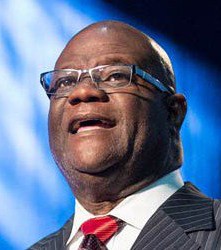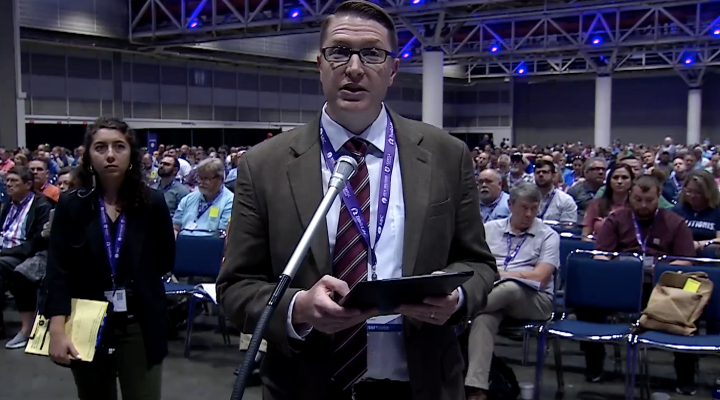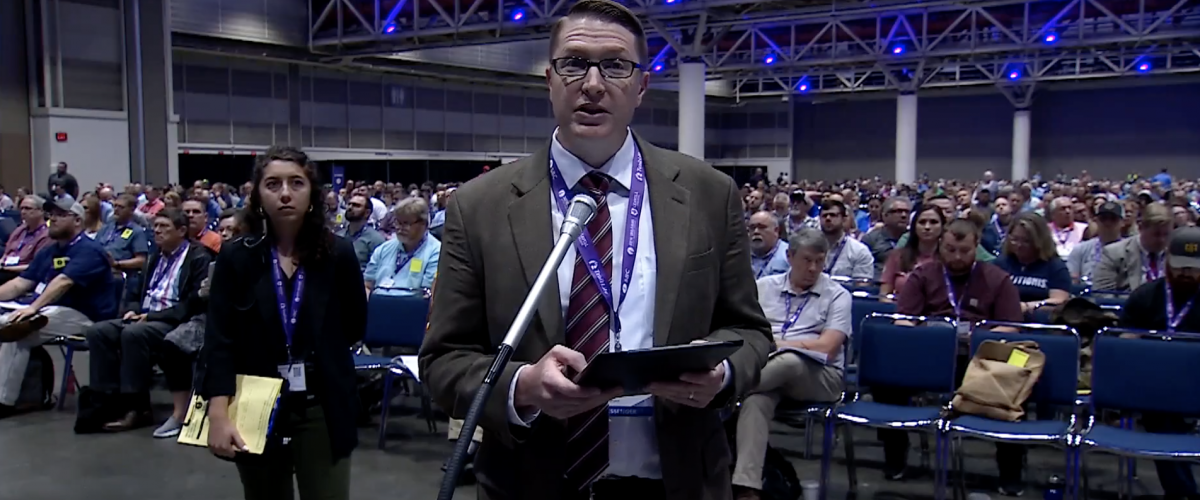When the Southern Baptist Convention meets in annual session in Indianapolis in June, one vote may be the most consequential in determining the future of the nation’s largest Protestant denomination. And it will not be the vote to elect an SBC president.
This vote will be the ultimate litmus test for whether the modern-day SBC will be defined by missional cooperation or by doctrinal conformity. And yet it is a vote about something most inside the SBC thought already was settled doctrine — until it suddenly wasn’t.
The issue is whether women may hold the office of pastor. Not just “senior pastor” as many churches use the term but any role with the title pastor or with perceived pastoral authority.
Yet even that description is subject to interpretation. For example, what if a church employs a woman as a “children’s pastor”? For some, that avoids the problem of women having spiritual authority over men because even boy children are not yet “men.” For others, even this is too much because they believe the very word “pastor” may be assigned only to men.
Taking a second vote on the proposed Law Amendment to the SBC Constitution will not solve these interpretation problems.
Taking a second vote on the proposed Law Amendment to the SBC Constitution will not solve these interpretation problems. The amendment got a first reading and vote last summer, but the Constitution requires two votes on such amendments.
The Law Amendment would add a new membership requirement: “Does not affirm, appoint or employ a woman as a pastor of any kind.” Only churches may be affiliated with the SBC, so this requirement would apply to any church seeking to be in “friendly cooperation” with the denomination.
Knowing how many churches are currently out of compliance with that standard is not easy. There are 47,000 SBC churches nationwide, each autonomous in its governance. The SBC cannot tell any church what to believe or teach, but it can limit which churches are allowed to call themselves “Southern Baptist.”
There are few, if any, SBC churches that employ women as senior pastors. That battle was fought in the late 20th century during the “conservative resurgence” that drove out “moderates” from the SBC. Many of those who left affiliated with the Cooperative Baptist Fellowship or the Alliance of Baptists — two newer groups that affirm women in all areas of ministry.
But a funny thing happened since then: Some SBC megachurches began to change their views on women in ministry, following the lead of some nondenominational and Pentecostal churches that operate with a modified view of male spiritual authority.
Exhibit A in this change is Saddleback Church in Orange County, Calif., started 40 years ago by Rick and Kay Warren. Saddleback was the largest church in the SBC — until it was kicked out last summer for ordaining women and allowing women to preach.
While most religious bodies would think twice before breaking ties with their largest and most influential church, the SBC barely blinked. The vote to remove Saddleback was not even close.
“While most religious bodies would think twice before breaking ties with their largest and most influential church, the SBC barely blinked.”
And lest smaller churches think they might remain unseen in this fight, remember also that last year the SBC expelled Fern Creek Baptist Church in Louisville, Ky., for having a female pastor — Linda Barnes Popham — who is more conservative in her theology than many male SBC pastors. The only thing that mattered in that decision was gender.
Given those two pieces of foreshadowing, the outcome of this summer’s vote might seem predestined. And it probably is. But not without a fight first. Because at the end of the day, this is not just about women. It is about strict doctrinal conformity.
The SBC has been heading into this mode for several decades now, a side effect of the conservative resurgence and a resurgent Calvinism. From 1925 until about 2000, the SBC was defined more by cooperative missions than strict doctrinal rules.
Now, the vote on women could open other avenues of expulsion from the denomination.
How it works
The SBC Constitution says a church may be deemed “in friendly cooperation” if it is “sympathetic with its purposes and work” and “has a faith and practice which closely identifies with the convention’s adopted statement of faith.”
That statement of faith is called the Baptist Faith and Message, and it outlines some parameters:
- The church’s “two scriptural offices are that of pastor/elder/overseer and deacon. While both men and women are gifted for service in the church, the office of pastor/elder/overseer is limited to men as qualified by Scripture.”
- “Christian baptism is the immersion of a believer in water in the name of the Father, the Son and the Holy Spirit. It is an act of obedience symbolizing the believer’s faith in a crucified, buried and risen Savior, the believer’s death to sin, the burial of the old life, and the resurrection to walk in newness of life in Christ Jesus. … Being a church ordinance, it is prerequisite to the privileges of church membership and to the Lord’s Supper.
- “The Lord’s Supper is a symbolic act of obedience whereby members of the church, through partaking of the bread and the fruit of the vine, memorialize the death of the Redeemer and anticipate his second coming.”
- “Christians should oppose racism, every form of greed, selfishness, and vice and all forms of sexual immorality, including adultery, homosexuality and pornography. We should work to provide for the orphaned, the needy, the abused, the aged, the helpless and the sick. We should speak on behalf of the unborn and contend for the sanctity of all human life from conception to natural death. Every Christian should seek to bring industry, government and society as a whole under the sway of the principles of righteousness, truth and brotherly love. In order to promote these ends Christians should be ready to work with all men of good will in any good cause, always being careful to act in the spirit of love without compromising their loyalty to Christ and his truth.”
Most of that is boilerplate Southern Baptist doctrine, although the points about abortion and homosexuality were added in 2000. There are some potential surprises, however, where you might least expect them.
There are SBC churches today that practice fully “open” Communion — meaning anyone present may partake of the Lord’s Supper. Strictly speaking, that’s not allowed by the Baptist Faith and Message, which says the supper is limited to “members of the church.”
There’s a deeper history in that, too, with a movement of the early and mid-20th century called Landmarkism that said only members of a particular local church may partake of the supper in that church.
If the limitation of female pastors is added and enforced, will the doctrinal statement on the Lord’s Supper also become a cause for disfellowship?
While the very foundations of Baptist history are predicated on baptism by immersion for believers only, some SBC churches have begun performing infant baptisms.
And what about infant baptism? While the very foundations of Baptist history are predicated on baptism by immersion for believers only, some SBC churches have begun performing infant baptisms — and more accept infant baptism as sufficient for later church membership rather than requiring an adult baptism by immersion.
Will these churches be expelled as well?
The answer comes down to two phrases in the Constitution: “sympathetic with its purposes and work” and “has a faith and practice which closely identifies with the convention’s adopted statement of faith.”
Just how “closely” does a church have to identify with the Baptist Faith and Message?
‘Nothing to worry about’
Defenders of the Law Amendment seek to counter these fears by saying everything will work out fine because the amendment doesn’t demand anything more than already is required by the Baptist Faith and Message.

Denny Burk
Here’s Denny Burk, one of the most vocal supporters of the amendment: “The amendment also reaffirms what our SBC constitution already calls for. Churches who wish to be in friendly cooperation with the convention ought to have a faith and practice that closely identify with calling only biblically qualified men as pastors.”
Burk serves as professor of biblical studies and director of The Center for Gospel and Culture at Boyce College. He also is president of the Council on Biblical Manhood and Womanhood.
In an earlier Baptist Press opinion piece, he wrote: “Churches with female associate pastors can have their messenger credentials challenged right now. There is nothing preventing that from happening right now. If such a referral came to the Credentials Committee, the committee could recommend removal even without the Law Amendment. Moreover, the Credentials Committee can recommend removal even if the Law Amendment were to fail. The Law Amendment does not add any powers to the Credentials Committee or to the messengers that they do not already have.”
Theoretically, churches that practice or allow infant baptism and churches that practice open Communion could be challenged right now, too. But that hasn’t happened yet. The SBC has not disfellowshipped any church for those reasons in modern history.
Neither has anyone made a list of such churches and circulated it online as some pastors have done to publicly name churches harboring female pastors. Clearly, these things are not being treated equally.
Although Burk contends they are. Messengers to any SBC annual meeting may use the governing documents to challenge any church’s participation.
“Southern Baptists understand that specific cases can have mitigating circumstances that might make removal a bad option.”
He quoted an interview with SBC President Bart Barber, who said the Law Amendment might pass and convention messengers might choose not to enforce it in a given case. “He is certainly right that this is a possibility, but I disagree with him that this would necessarily be a bad thing. Southern Baptists understand that specific cases can have mitigating circumstances that might make removal a bad option. And the messengers are free to vote as they please with or without the Law Amendment.”
He added: “In short, the Law Amendment does not make removal automatic. Someone would still have to refer such a church to the Credentials Committee. The Credentials Committee and the Executive Committee would still have to vote whether or not to recommend removal, and upon appeal so would the messengers. At every step of the way, the relevant authorities have to weigh the evidence, deliberate, make a judgment and vote. And they are free to vote however they please with or without the Law Amendment.”
On the other hand
One of the most vocal and public critics of the Law Amendment is Arlington, Texas, pastor Dwight McKissic.
He recently tweeted: “If the Law Amendment passes, the chilling message that it sends to women is, your gender is a disqualifying factor, above your giftedness given to you by God’s Spirit, in the realm of serving and being trained in an SBC context, to serve as an associate or assistant pastor in your area of giftedness. What’s the point in enrolling in seminary, or aspiring to serve on a church staff, if my gender alone precludes me from serving as associate pastor of women, children, youth, education, business administration, etc.?”
“If the Law Amendment passes, the chilling message that it sends to women is, your gender is a disqualifying factor, above your giftedness given to you by God’s Spirit.”
He sees the Baptist Faith and Message restriction on female pastors as meaning only the senior pastor role. “It does not restrict women serving in associate and assistant roles, nor does it restrict a woman from preaching under the authority and invitation of a male lead pastor. If the Law Amendment passes, it would set the convention back tremendously, and make our seminaries unattractive to many and place glass ceilings on women in churches that the Bible doesn’t place on them.”

Dwight McKissic
Cornerstone Baptist Church, where McKissic is senior pastor, lists two women with the title “minister” on its website. One serves as minister of education and women’s ministries. Another serves as minister of communications and special events.
McKissic, who is Black, sees unwelcome parallels between the Law Amendment and the SBC’s founding history of racism.
“The Law Amendment treats gender just as the SBC has historically treated all non-white races: Your race is a disqualification; now, your gender is a disqualification,” he wrote. “I pity the SBC local church who would grant the SBC that kind of unilateral authority over women in their church. Vote against the Law Amendment.”
If the Law Amendment passes, at least churches will know clearly where the denomination stands, he concluded. “If the majority of messengers vote by a 67% majority vote to ratify the Law Amendment in Indy, they’ll do so with full awareness that they would be alienating multiple thousands of women, churches, pastors and future seminarians. Nevertheless, as painful as it might be, I would appreciate their honesty and transparency and walk away with a clear and clean conscience that those of us who’re marginalized by the vote were simply not wanted in the SBC. Mama taught me, ‘Son, you don’t want to be, where you’re not wanted.’”
The SBC annual meeting is scheduled for June 10-12.
Related articles:
As SBC moves toward second vote on Law Amendment, debate continues on just what it means
Anti-egalitarian forces make clean sweep at SBC annual meeting
Saddleback and Fern Creek churches face off against Al Mohler at SBC meeting
Female pastors: Appointed or apostate? Southern Baptists decide | Opinion by Melody Maxwell
An open letter to all Southern Baptists | Opinion by Rick Warren
A primer on why Southern Baptists are fighting over women in ministry once again | Analysis by Mark Wingfield


